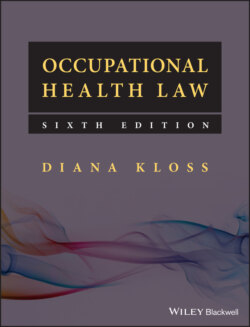Читать книгу Occupational Health Law - Diana Kloss - Страница 29
Management of sickness absence
ОглавлениеThe two independent reviews, the Black Report and the Black/Frost Report, led to changes in the certification of sickness absence and the creation of a publicly‐funded occupational health advisory service which was abandoned after only two years.
In 2008 the employer’s obligation to pay statutory sick pay depended on a GP or hospital doctor certifying on a ‘sick note’, after an absence of more than seven days, that the employee was unfit for work through ill‐health for a stated period.
Dame Carol recommended that doctors should be able to suggest, in appropriate cases, on a ‘fit note’ that an employee, although unable to perform the full duties of his job, could return to work in some capacity if suitable adjustments were made. This was based on evidence that the longer the employee remained out of the workplace the less likely he was ever to return. She also recommended that the Department for Work and Pensions (DWP) commission a free advice service for employers, principally for the benefit of those who had no access to their own occupational health service.
The fit note was introduced in 2010. It allows the doctor to state that the employee is unfit for any work for a period or fit for some work, but not that the employee is fit for all work. The doctor can recommend adjustments to assist the employee to return and four possibilities are available on the note: a phased return, amended job duties, altered hours of work and workplace adaptations. The doctor may write in another option they think appropriate. There is no legal obligation on the employer to comply with any recommendation, but they are well advised to take it seriously and talk it over with the employee to see whether it is reasonably practicable. If the employee has a disability under the Equality Act the employer has a legal duty to make reasonable adjustments (Chapter 8). Fit notes are now recorded electronically. GPs are often reluctant to use the option of suggesting adjustments because of lack of occupational health training. The joint Work and Health Unit of the Department of Health and Social Care/Department for Work and Pensions commissioned guidance from the Council for Work and Health: Talking Work: a guide for Doctors discussing work and work modifications with patients which was published in 2019. The Council for Work and Health is the body set up to represent all the professions involved in the provision of occupational health services. In May 2019 DWP guidance on Statutory Sick Pay was amended to advise that a report from an allied health professional (for example a physiotherapist or occupational therapist) is as satisfactory evidence that the employee is unfit for work as a fit note from a GP or hospital doctor.
In 2015 a new independent health and work advisory and assessment service, Fit for Work, was introduced. This was funded by the state and free to employers and employees. The DWP contracted with a private provider company in England and Wales and NHS Scotland in Scotland to provide the service. GPs were able to refer an employee with their consent to the service and the employer could also refer, with consent, after four weeks’ absence if the GP had not done so. It was primarily a telephone service staffed by OH professionals, although a face to face assessment could exceptionally be requested. Following the assessment, the employee was provided with a return to work plan suggesting measures to assist a return which he could, if he wished, share with the employer. The scheme was abandoned in 2017 because of low referral rates, but a free advice line remains. In addition, if an employer pays for an employee to receive treatment, for example physiotherapy or cognitive behaviour therapy recommended by an OH professional to enable them to remain in or return to work, this is free of tax up to £500 per employee per annum.
In 2019 there was a new initiative led by the Work and Health Unit. The government published a consultation document: Health is everyone’s business: proposals to reduce ill‐health related job loss. Each year more than 100,000 people leave their job following a period of sickness absence lasting at least four weeks. Offering flexibility, early support and occupational health advice are the key to successful retention in the workplace. The consultation is focused on four main areas: amending the legal framework to encourage early action to support individuals when they are absent from work and to facilitate more conversations to agree effective workplace modifications; reforming Statutory Sick Pay; measures to improve the availability of high‐quality, cost‐effective OH services for employers; and improving advice and support from government for employers to understand and act on their responsibilities.
